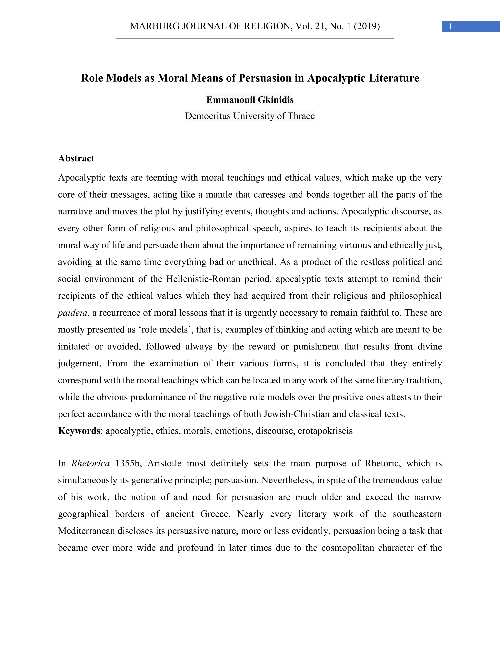Role Models as Moral Means of Persuasion in Apocalyptic Literature
Apocalyptic texts are teeming with moral teachings and ethical values, which make up the very core of their messages, acting like a mantle that caresses and bonds together all the parts of the narrative and moves the plot by justifying events, thoughts and actions. Apocalyptic discourse, as every ot...
Tallennettuna:
| Julkaisussa: | Marburg Journal of Religion |
|---|---|
| Päätekijä: | |
| Aineistotyyppi: | Artikel (Zeitschrift) |
| Kieli: | englanti |
| Julkaistu: |
Philipps-Universität Marburg
2019
|
| Aiheet: | |
| Linkit: | Linkit |
| Tagit: |
Lisää tagi
Ei tageja, Lisää ensimmäinen tagi!
|
| Yhteenveto: | Apocalyptic texts are teeming with moral teachings and ethical values, which make up the very core of their messages, acting like a mantle that caresses and bonds together all the parts of the narrative and moves the plot by justifying events, thoughts and actions. Apocalyptic discourse, as every other form of religious and philosophical speech, aspires to teach its recipients about the moral way of life and persuade them about the importance of remaining virtuous and ethically just, avoiding at the same time everything bad or unethical. As product of the restless political and social environment of the Hellenistic-Roman period, apocalyptic texts attempt to remind their recipients of the ethical values which they had acquired from their religious and philosophical paideia, a recurrence of moral lessons that it is dire need to remain faithful to. These are mostly presented as ‘role models’, that is, examples of thinking and acting which are meant to be imitated or avoided by them, followed always by the reward or punishment that comes as a result by means of divine judgement. Through them. the writers manage to enhance the clarity of their teachings, leaving no room for misunderstanding, concerning the true meaning of their messages. From the examination of their various forms, it is concluded that they totally correspond with the moral teachings which can be located within any work of the same literary tradition, while the obvious predominance of the negative role models over the positive ones attests to their perfect accordance with the moral teachings of both Jewish-Christian and classical texts. |
|---|---|
| DOI: | 10.17192/mjr.2019.21.7819 |
 Publikationsserver
Publikationsserver